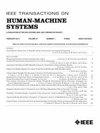Design and Investigation of a Suspended Backpack With Wide-Range Variable Stiffness Suspension for Reducing Energetic Cost
IF 3.5
3区 计算机科学
Q2 COMPUTER SCIENCE, ARTIFICIAL INTELLIGENCE
引用次数: 0
Abstract
Suspended backpacks have been acknowledged for their advantages in load carriage, leading to the development of various designs aimed at enhancing their performance. However, current suspended backpacks typically possess fixed stiffness or limited adjustability, thereby limiting their adaptability to different load carriage tasks, such as varying walking speeds and load masses. This article introduced a suspended backpack design capable of modulating its stiffness over a wide range while maintaining a lightweight profile. The variable stiffness suspension (VSS) was integrated into the load frame of the suspended backpack and utilized a motor to adjust the stiffness by generating spring-like force based on the relative displacement between the load and the body. Experimental validation was conducted to assess the stiffness modulation of the suspended backpack. The VSS enabled the stiffness modulation of the suspended backpack ranging from 424 to 2182 N/m, which corresponded to the desired stiffness range for a 10–25 kg load at walking speeds for 3.5–6 km/h. Moreover, the mechanics of the carriers were analyzed to evaluate the impact of the suspended backpack on the individuals. Results showed that the designed VSS suspended backpack could reduce peak push-off force by 20.71% under the high working condition and energetic cost by 30.39% under the midworking condition. However, a tradeoff exists between minimizing the peak accelerative load force and energetic cost. The proposed design holds the potential for enhancing performance across various load carriage tasks, including human-in-the-loop energetic optimization.设计和研究用于降低能耗成本的宽范围可变刚度悬挂式背包
悬挂式背包在负载运输方面的优势已得到公认,因此开发了各种旨在提高其性能的设计。然而,目前的悬挂式背包通常具有固定的刚度或有限的可调节性,从而限制了其对不同负重任务的适应性,例如不同的行走速度和负载质量。本文介绍了一种悬挂式背包设计,它能够在大范围内调节刚度,同时保持轻巧的外形。可变刚度悬挂装置(VSS)被集成到悬挂式背包的负载框架中,并利用电机根据负载和人体之间的相对位移产生类似弹簧的力来调节刚度。实验验证对悬挂式背包的刚度调节进行了评估。VSS 使悬挂式背包的刚度调节范围从 424 牛米到 2182 牛米,符合 10-25 公斤负载在 3.5-6 公里/小时步行速度下所需的刚度范围。此外,还对背负物的力学进行了分析,以评估悬挂式背包对人体的影响。结果表明,所设计的 VSS 悬挂背包在高强度工作条件下可减少 20.71% 的峰值推脱力,在中强度工作条件下可减少 30.39% 的能量成本。然而,在最大限度地降低峰值加速负荷力和能量成本之间存在权衡。所提出的设计有可能提高各种负载搬运任务的性能,包括人在回路中的能量优化。
本文章由计算机程序翻译,如有差异,请以英文原文为准。
求助全文
约1分钟内获得全文
求助全文
来源期刊

IEEE Transactions on Human-Machine Systems
COMPUTER SCIENCE, ARTIFICIAL INTELLIGENCE-COMPUTER SCIENCE, CYBERNETICS
CiteScore
7.10
自引率
11.10%
发文量
136
期刊介绍:
The scope of the IEEE Transactions on Human-Machine Systems includes the fields of human machine systems. It covers human systems and human organizational interactions including cognitive ergonomics, system test and evaluation, and human information processing concerns in systems and organizations.
 求助内容:
求助内容: 应助结果提醒方式:
应助结果提醒方式:


